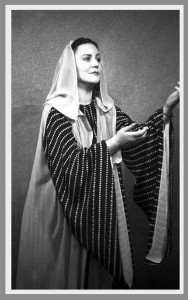Tu che di gel sei cinta,
Da tanta fiamma vinta
L’amerai anche tu!
Prima di quest’aurora
Io chiudo stanca gli occhi,
Perché egli vinca ancora…
per non… per non vederlo più!
Elena Arizmendi
https://www.youtube.com/watch?v=Jyyd3EgNDtk
 Argentine soprano Helena Arizmendi (born on April 15, 1927) studied with Maria Barrientos. Her career at the Teatro Colón spanned 24 years. It started in 1945 with „Armida“ and ended in 1969 with Cimarosa´s „Il Matrimonio segreto“. Her repertory included among other operas Bohème, Don Pasquale, Mefistofele, Orfeo ed Euridice, Falstaff, Le Donne curiose, Gianni Schicchi, Amelia al ballo and L´amico Fritz. Some of her best-remembered performances at the Colón included Bohème with Beniamino Gigli conducted by Héctor Panizza, and Turandot with Maria Callas and Mario del Monaco conducted by Tulio Serafin. She died only in February of this year.
Argentine soprano Helena Arizmendi (born on April 15, 1927) studied with Maria Barrientos. Her career at the Teatro Colón spanned 24 years. It started in 1945 with „Armida“ and ended in 1969 with Cimarosa´s „Il Matrimonio segreto“. Her repertory included among other operas Bohème, Don Pasquale, Mefistofele, Orfeo ed Euridice, Falstaff, Le Donne curiose, Gianni Schicchi, Amelia al ballo and L´amico Fritz. Some of her best-remembered performances at the Colón included Bohème with Beniamino Gigli conducted by Héctor Panizza, and Turandot with Maria Callas and Mario del Monaco conducted by Tulio Serafin. She died only in February of this year.
Arizmendi has a truly latin-voice: a rich and vibrant lyric soprano with the necessary cutting edge to be heard over the orchestra, yet never shrill or edgy. She has a good fullness and roundness without sounding heavy. One also hears her solid “old-school” training, not common anymore in the 1950s…. One might argue, that her singing is too straightforward and wish for more spinning of the notes. She might lack real finish or the touch of genius, but I find this among the most satisfying versions of the aria. Good diction, the tenderness of the first „l´amerai anche tu“, the resigned sadness of „chiudo stanca gli occhi“. A recording which I find well holds its own against Lotte Schöne´s. After all – given a similar vocal level – it´s not really about “better or worse”, but about different approaches. I found the very “Latin”, passionate and direct Arizmendi a beautiful contrast to Schöne´s touching simplicity.
Lotte Schöne
LOTTE SCHÖNE Tu che di gel sei cinta
Lotte Schöne (née Charlotte Bodenstein in 1891/94) became on of the last students of Johannes Ress (1839-1916; teacher of Erik Schmedes, Melitta Heim and Selma Kurz, among others) and married Paul Schönwälder in 1911, giving birth to a boy in 1913. Her artistic name might well be a the short form of her husband´s name. Her first operatic performance was at the Vienna Volksoper as Brautjungfer in „Der Freischütz“. She advanced to the Staatsoper in 1917 debuting as Frasquita in Carmen. Both Vienna and Berlin had signed her up for eight seasons before she had to leave Germany in 1933. Festival appearances in Salzburg, France and occasional appearances in London, Florence, the Netherlands and Budapest soon were to follow. It was as Liu, that she won the immediate admiration of London audiences.
This was at the British premiere of Turandot in June 1927 (with Bianca Scacciati and Francesco Merli), when out of that cast she was everybody’s favourite singer, setting a standard by which all her successors in the role came to be judged. At that time her career was centred on Berlin, where she was an essential part of the famous ensemble under Bruno Walter. Her eight years in Berlin were the early apex of a career that was to be tragically cut short by persecution and exile. When she gave her farewell performance on June 12, 1933 as Gilda (conducted by her old friend Leo Blech) she received a standing ovation. Her audience knew she had to leave and they also knew why. Lotte Schöne flew to Paris where she sang both at the Opéra and the Opéra comique, she even appeared at the Salzburg Festival in 1935 and made concert tours in Europe. But when the Germand occupied Paris she fled to the Basses-Alpes in Southern France where she was hiding until the end oft he War. She tried to continue her career afterwards and gave some concerts, but she was 55 already – and times and manners in opera had changed… Lotte Schöne died in Bobigny near Paris on December 22 or 23 1977.
What an utterly feminine timbre. Heartfelt and intimate – touching and sensual, controlled and fragile all at the same time. And what an exquisite singer. Total control of her instrument, yet never giving the impression of sounding calculated and „made“. Although you can clearly hear the German school-training, her singing is less „instrumental“ than that of other sopranos of her days. Sensual, vibrant, NEVER lachrymose or vulgar, always heartfelt, sincere and intimate. She sings this aria with more intimacy then Arizmendi, with beautiful spinning of the notes, without sounding light-weight. Maybe she puts less weight on the words themselves, but more on colouring the voice. She creates an atmosphere of poetry and „dolcezza“ – the very essence of Liù – and gives an infinitely touching portrait of this tragic self-sacrifice.

